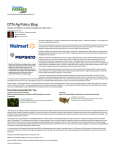HFCS could suffer as economy improves, says Mintel
HFCS has faced a torrent of bad publicity, particularly following the 2004 publication of an influential study in the American Journal of Clinical Nutrition that noted the parallel between obesity and the rise in high fructose corn syrup consumption, and hypothesized that the two could be related. The study’s authors have since said they were wrong in their speculation but the backlash against HFCS has continued.
Mintel’s report, entitled “Attitudes Toward Sodium and High Fructose Corn Syrup Reduction - US - August 2010”, said that even though most Americans (64 percent) believe that HFCS is fine to be consumed in moderation, 52 percent claim to avoid products in which it is listed as one of the first ingredients.
“This indicates that manufacturers will want to scrutinize ingredient lists and consider, at minimum, reducing the amount of HFCS in their products when it is a primary ingredient,” the market researcher said.
The food and beverage industry began to switch to HFCS as a cheaper alternative to sucrose in the 1980s. It is still an ingredient that significantly reduces cost for manufacturers – at about half the price of sugar – but some in the industry, like Hunt’s Ketchup and Nabisco Oreo Thin Crisps, are now responding to consumer demand for HFCS-free products and substituting the sweetener with sugar.
“That trend is likely to continue and the rate of avoidance may accelerate if the economy improves and consumers become more willing to pay a premium for beverages and foods made without HFCS,” Mintel said.
Mintel also found that more affluent and better educated consumers are more likely to avoid HFCS than other demographics, leading it to suggest that companies offering HFCS-free foods and beverages could find colleges lucrative outlets for their products.
“The fact that consumers are attending college at the highest rate in history suggests that demand for HFCS-free products will be growing in the future unless the Corn Refiners Association (CRA) or others convince the nation’s students and college graduates that HFCS is essentially the same as sugar,” Mintel said.
CRA has made a concerted effort through advertising and marketing campaigns to convince the public that HFCS used in foods and beverages is not dissimilar in its makeup to sugar (sucrose), which contains 50 percent glucose and 50 percent fructose.
There are three different types of HFCS – one that is 55 percent fructose and 42 percent glucose (most commonly found in soft drinks), one that is 42 percent fructose and 58 percent glucose (usually used in food products), and one used for specialty applications that is 90 percent fructose and 10 percent glucose.
However, despite CRA’s efforts so far, sales of HFCS at Archer Daniels Midland, Tate and Lyle, and Corn Products International declined about nine percent between 2007 and 2009, the market researcher reported.
“Current trends suggest that the decline will continue in 2010,” it said.














